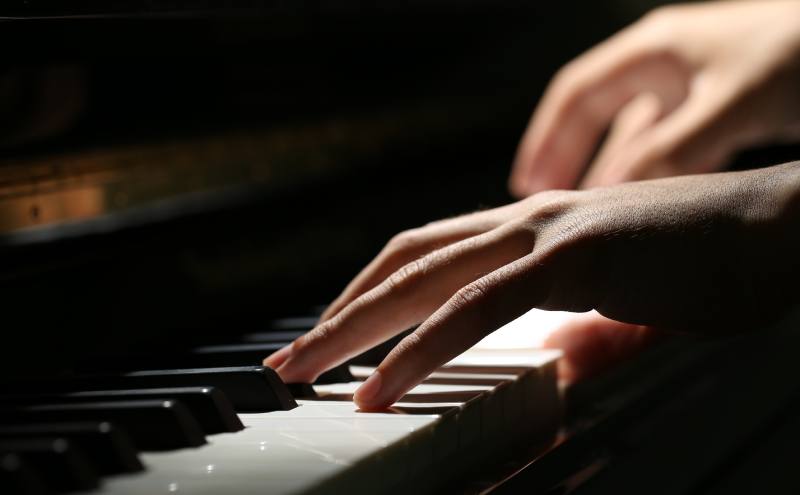
2022 Medical Humanities Section Writing Award Winner – Prose Category Rachel Kowalsky, MD
The Pianist
By Rachel Kowalsky, MD
Solomon was fifty-five now, and done with the constraints of tempo and time. He worked at Mercy Hospital, where nobody cared if he played forte instead of piano, pried open a crescendo like a piece of fruit and mined it for its very seeds and pulp, or held a resounding note a few beats longer than specified by the dead man who’d written it. The notes on the page were a conversation, that’s what, between the living and the dead. Inflecting them with his own thoughts and feelings did not make him a jazz pianist (as had been suggested at conservatory); it confirmed his humanity, signaled that he was alive.
Mercy was a paying gig, rare in the world of hospital music. There were three pianists on the payroll, and a violinist who came once a week—or had come. Mack had been let go. The hospital was in the red, and Mack was the most recent hire.
The virus was the culprit. It changed everything. Early on, Linda from Special Events had snapped a mask onto Solomon’s face (he was grateful, masks were hard to come by), and the next day she click-clacked across the busy lobby while Mack was finishing up his shift. She took him aside, saying whatever one says to fire a hospital violinist. He shuffled out the revolving door with shoulders hunched, clutching his used Cremona to his chest.
Soon the hospital lobby was transformed, the café tables removed and replaced by temperature checkpoints. Solomon’s Steinway was downsized to a boxy upright, and pushed against the wall to make space for the little circles where people had to stand. He sat facing outward, back to the wall. When more space was needed, he was displaced towards the northern exit, by the door to the new white refrigerated trucks. A crew of men erected plexiglass around him.
Solomon knew the plexiglass was important, but it pained him. His music bounced back to him, clawed its way desperately up and over the wall, falling flat over the sides of his enclosure. Between the upright’s muddy tone and its suffocated soundwaves, even the delicate Für Elise sounded like funhouse music.
Worse yet, he felt solitary behind the plastic. While he had few friends, he was not a loner, and the disconnection from his audience made him lightheaded with anxiety. Doctors and nurses rolled stretchers past him on their way to the trucks, banging into the plexiglass and shaking the little fishbowl of an enclosure, their eyes sometimes brimming with tears, sometimes bleary or blank above their masks. When their gaze met his, he felt a kinship: they were all caught in a type of cage, they were alive together, yet each was profoundly alone.
Around that time, the other two pianists went the way of Mack, so Solomon was the only musician left on the payroll of Special Events. Sometimes Linda came by to listen to him play. She brought a folding chair down in the elevator with her, and she sat with her elbows on her thighs and her chin in her palms. Some days she removed her glasses and wept openly, others she acted like nothing was happening, like she was at Lincoln Center and the banging of the stretchers was nothing but a bunch of loudmouths taking their seats after intermission. Sometimes she brought a boy with her—her grandson, she said—and they both unfolded chairs and sat listening, two birds on a branch.
Despite the fog of grief and fear that had seized the hospital, or perhaps because of it, Solomon was at his most musical during that time. He had often wondered whether he felt too much, as when the sight of the moon (the MOON!) moved him to tears. The great hunk of rock and metal glowed with such outrageous beauty, it made him tremble from head to toe. But the enormous emotions that possessed him ad nauseum—inchoate and disallowed as they were—seemed to be acceptable when channeled into music. Not everywhere, because of the complete abandon with which he played, but certainly here at Mercy. The hospital existed as he did, with great crescendos and decrescendos of sorrow, hope and devastation. So while his head thrummed with fear and loneliness, he did not look away. He did not even know how. His music grew richer, more nuanced.
In those days, everybody knew somebody who died, and in Solomon’s case that person was the piano tuner. There was a hiring freeze at Mercy, so Linda asked Solomon if he could tune the little upright himself. He didn’t know how to tune a piano, but she sent him a link to an online course and he vowed to do his best. The trouble was, he needed tools--a tuning hammer and a set of mutes. The only dot com that had them in stock displayed a message saying nothing could be shipped until the following year, but he placed the order anyway, and waited.
The upright, already compromised by its verticality—its trills sluggish, its action for the dogs—grew outrageously out of tune.
One day in mid-April, Mercy banned all visitors. They would step up to the information desk ready with names and room numbers, only to be turned away. Their protests filled the enormous lobby, swam over Solomon’s plexiglass and moved him. He considered his programme du jour: Clair de Lune, Moonlight, Mendelssohn in A Major, or better yet in E. But inexplicably, the variations on Ah, Vous Dirais-Je Maman came to mind and eclipsed all. The would-be visitors, unable to visit, would be moved by the familiar sweetness of its theme, then amazed by Mozart’s brief and brilliant adaptations. Each little gem—there were twelve variations--would recall the durability of the moon in its orbit, the flower on its STEM!
He began immediately.
He delivered the theme in two-four, as Mozart had prescribed. A few people pivoted inside their designated circles, craning towards the sudden bright sound. Solomon did not look up from the keys, but he could see their bodies shifting beyond the plexiglass as if through a fog.
He had nearly completed the theme when a run of trills broke away from him, and he gave chase. He skidded into the first variation, letting the high D’s and E’s really have it. Then he ripped through the second-third-and-fourth, slowing only for the fifth variation so that his two hands could speak and listen properly to one another--he was not a barbarian after all--but by the seventh he was riled up again, striking the dotted quarters like his very life depended on it: DA DA DA DEEEEEEEEE DA DA! Solomon leaned hard into F sharp and G, he filled the lobby with their splendor. A few people had stepped out of their circles now, and drew near the plexiglass, arms folded, heads inclined towards the sound.
He nodded at them, a pilot at the ready, all systems go for variation number eight. It was a morose and tentative tune which he knew could be quite deadly on his twanging instrument, more haunted wood than heavenly grove, but he had committed, he would have to press on.
Decrepit eight, airy nine, lovely lyrical ten.
A boy with a shock of orange hair rapped on the plexiglass, startling him. Solomon glanced up and the boy made a conducting gesture with his index finger, drawing a delicate arc in the air. It was Linda’s little grandson, of the folding chair and bird-like countenance. The boy wore a strange expression—what was it? Suffering and what? Affiliation? As though he’d found some precious thing that had gone missing.
But Solomon turned away: it was time for the Adagio. He closed his eyes, sighed, let his shoulders rise and his heart fill, empty, fill as he played. When he came to the fermata—a quick breath before the final phrase of music—he mined the thing for all it was worth, raised his hands high above the keys, let the penultimate notes fill the space above and around him, and silence follow. He bowed his head. One man sat down right on the floor. One woman cried on the shoulder of a stranger. A few people clapped. When he finished the song, the un-visitors drifted slowly away. Solomon was alone.
Shortly thereafter his hours were cut in half, and he struggled to make ends meet. Linda offered him per-diem work folding the face shields printed in the 3-D lab, so he set to work in his spot behind the plexiglass, folding the edges and fitting the elastic straps into place. This was hard on his hands, which grew calloused and stiff. His knuckles swelled with arthritis. But he did his best.
One Friday afternoon while the doctors crept around him, barely breathing as they pushed their stretchers towards the trucks, Solomon sat at his upright and felt that he could not play. His hands ached, but it wasn’t his arthritis; his heart felt heavy, as empty as the sky.
He summoned all his strength and began a lacrimosa. He played haltingly, painfully, sending tendrils of music over the thick plexiglass like little boats onto his beloved Hudson, accepting the twang and buzz of his un-tuned piano, the tin and the echo of it. But part way through, just as Mozart had gunned the motor, Solomon’s heart sputtered and stopped. Not that he died, but his spirit did, right in the middle of the music, and so he removed his hands from the keys and folded them quietly on his lap.
There came a loud rap from outside his fishbowl. He turned and saw a wild-eyed woman, middle aged, with a child at her side. Her hair was tangled and makeup smeared. She wore sweatpants, a ragged Henley, and dark glasses.
“Play the piano!” She shouted. She pounded against the plexiglass. He scanned the lobby; she must have come through a different door—the one by the trucks—bypassing security. The boy at her side was weeping, and now Solomon could see that it was Linda’s grandson again, with the orange hair. Didn’t he ever go to school? Of course not, nobody did anymore. And here came Linda clacking down the hall towards them, so that the little family—Linda from Special Events, her distraught daughter and weeping grandson—all stood on the other side of the plexiglass, staring at Solomon with bottomless need.
He lifted his hands to the piano but they fell like lead, discord bursting from the little matchbox. He raised one finger and tried to play a few notes of Ah Vous but nothing happened. He shook his head helplessly.
Don’t just sit there! screamed the woman, Linda’s daughter, pounding the plexiglass so that it heaved and shook around him. Have some humanity!
Solomon trembled. How she misunderstood him. The problem was precisely his humanity, which had been sapped, drained, dismissed together with Mack, extinguished beside the piano tuner, and folded, during long hours of painful labor, into the masks they all wore.
Linda apologized. She took her daughter’s hand and led her away, gesturing to her orange-haired grandson to follow. Heels click-clacking, she crossed the lobby and led them out the revolving door to the taxi stand, where she kissed and hugged them and helped them into a cab.
Mother and son rode the taxi through the city’s empty streets and entered their apartment in silence. She put her keys down and opened the window. Closed it, opened it again. When she crumpled at the kitchen table with her head in her hands, the boy sang alone in his room. In a warble full of melancholy, he made up his own lacrimosa for his ill father and the hunched-over pianist who had not been able to play. He sang with the sweet brassy heft of an unfolding life, the ineffable moon, the OCEAN that would always reach for it. His mother sat and listened, her heart breaking, emptying, filling up again.



